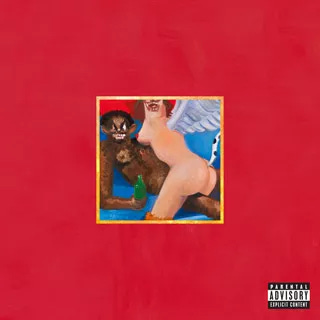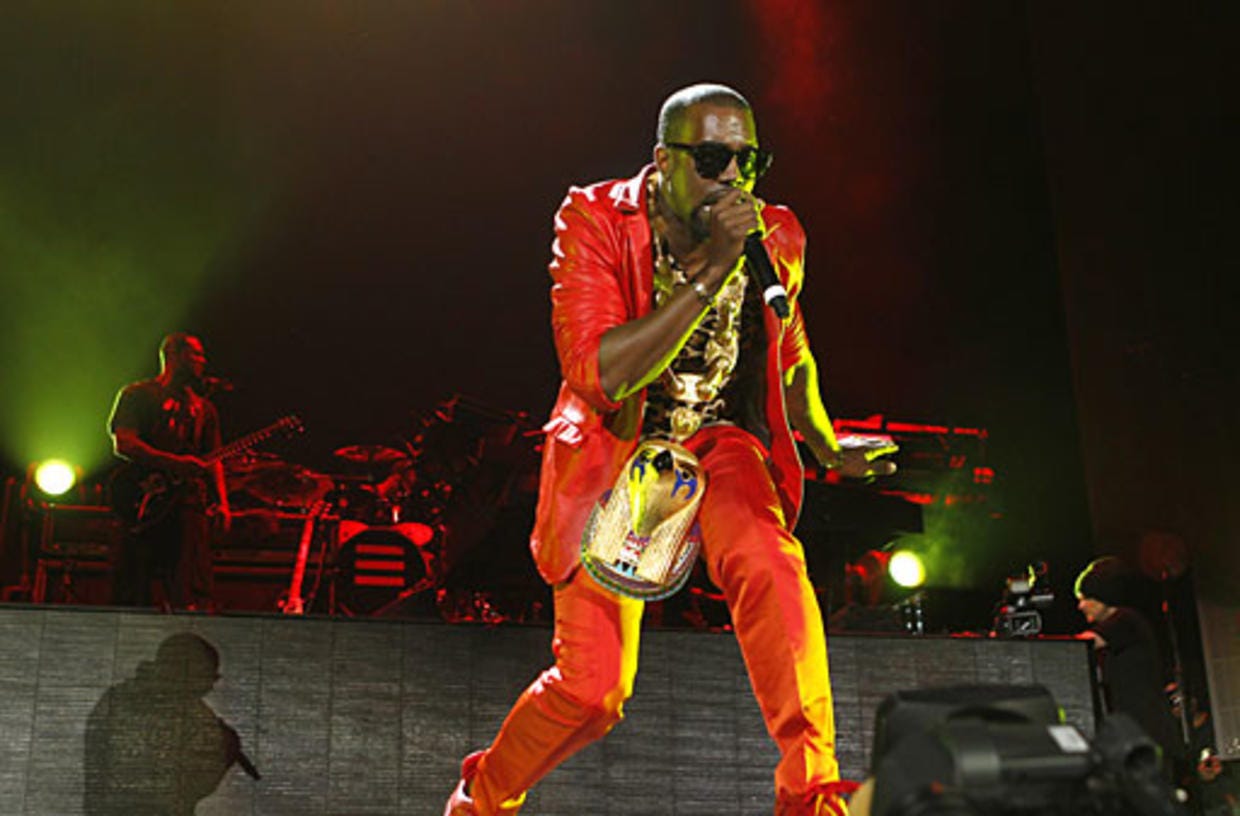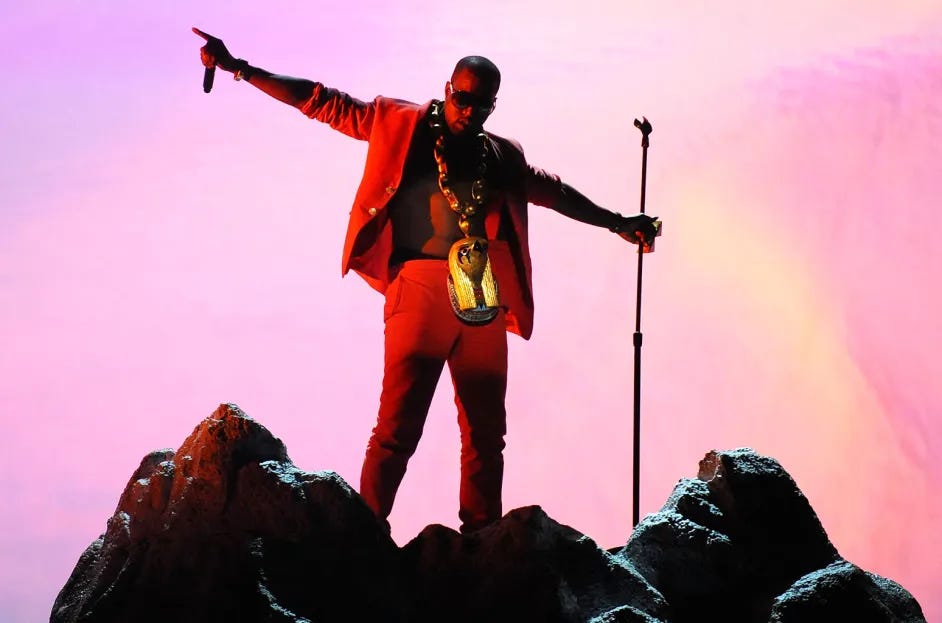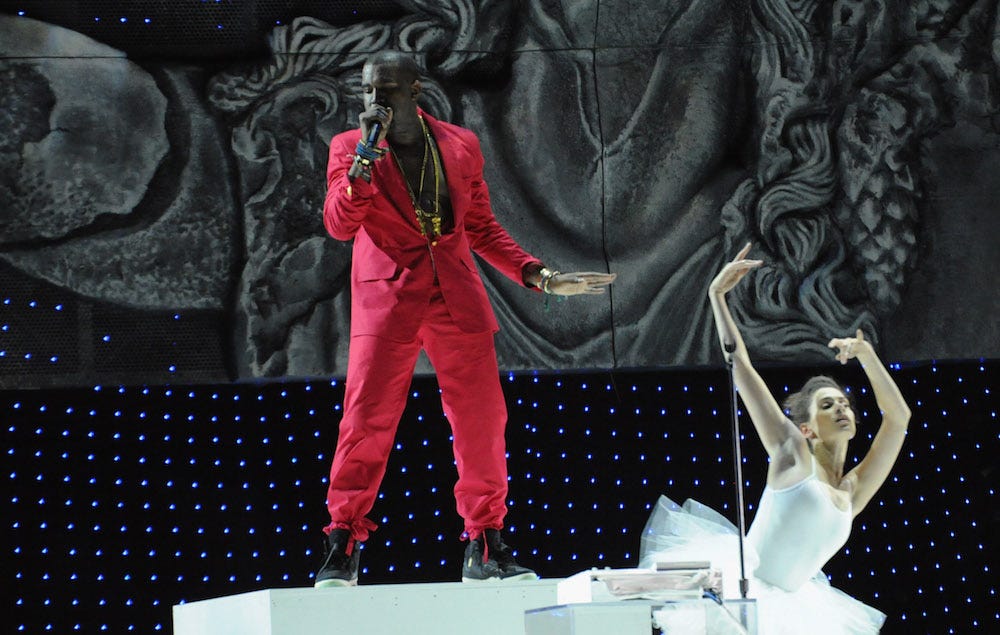When You Regret Your Greatest Achievement: Kanye West's Resentment of 'My Beautiful Dark Twisted Fantasy'
Kanye West wanted to get his fans back with his 5th album, "My Beautiful Dark Twisted Fantasy," and he did...but at what cost?
“I don’t care about having a legacy; I don’t care about being remembered. The most important thing for me is…what can we do for each other that can make life easier, make life doper for our kids as they grow.” – Kanye West, Time Magazine 2015
Call Kanye West whatever you like - a MAGA supporter, a father, an antisemite, a narcissistic, a fashion mogul, a victim of mental illness, an innovator, a self-hating elitist - one thing he’ll always be is a recording artist.
Now, the moniker “recording artist” is often overused & misused, but for West, it’s a spot-on description. It’s a disservice to call him just a rapper, especially since his production skills are more potent. However, identifying him as a rapper/producer also misses the point.
West sees himself as an artist. After all, he was a visual artist as a youth. He was so serious and talented, that he attended an art college before ultimately dropping out to work on music full-time. However, his passion for making music videos, shoes, fashion, and live staging speaks mostly to his roots as a visual artist.
“I am a pop artist, so my medium is public opinion and the world is my canvas,” West said at the Art Institute of Chicago after being given a 2015 honorary doctorate (which has since been rescinded over his aforementioned antics). He considers himself a provocateur and futurist.
This is why West resents his fifth album: My Beautiful Dark Twisted Fantasy (MBDTF). If you ask fans and critics, this album is considered a masterpiece. Pitchfork gave the album a 10 out of 10 score, calling it “an instant greatest hits, the ultimate realization of his strongest talents.” If you ask West, that is what he was trying to do…and that was the problem.
West wants his music to be a reflecting his progressive spirit, and not sound like the last record. More importantly, West needs to feel like the world is against him in order to do his best work.
“I’m not here to make easy listening, easy programmable music.” – Kanye West, BBC1 2013
(Kanye West at Yankee Stadium, Sept. 13, 2010, in New York. AP Photo/Jason DeCrow)
When it comes to his music, West has never wanted to repeat himself as a solo artist. After establishing himself as a premier record producer for artists like Jay-Z, Twista, and Talib Kweli, his “Chipmunk Soul” soul sound, named after speeding up the vocals on R&B records from the 1960s and 1970s, reached its zenith on his 2004 debut, The College Dropout.
The following year, when fans expected more of the same, he enhanced his sound with symphonic orchestral arrangements, courtesy of co-producer Jon Brion. Late Registration was birthed and fans ate it up.
Then in 2007, West took the lessons he learned from opening for U2 on tour and crafted a stadium sound, with more electronic instrumentation, simpler hooks and pop samples. With Graduation, West achieved his dream of being the biggest rapper in the world.
Unfortunately, the death of West’s mother, Dr. Donda West, shortly after Graduation’s release dampened what should have been a victorious time. Coupled with the end of his engagement, West abandoned all previous conventions for his next album, opting to sing instead of rap. He recruited Kid Cudi, mentor No ID, and Jeff Bhasker to match somber lyrics of loss with synth pop and icy polyrhythms. The result was the polarizing, but insanely influential 808’s & Heartbreak.
West managed to reinvent himself at every turn. His first four albums pushed Hip-Hop to heights that few have tried or thought was possible. Then on September 29, 2009, everything changed.
At the 2009 MTV Video Music Awards (VMAs), West infamously interrupted Taylor Swift after she won her award for Best Female Video of the Year. “Imma let you finish, but Beyoncé had one of the greatest videos of all time!”
(Kanye West performing “Runaway” at the 2010 MTV VMAs. AP Photo/Matt Sayles)
West was panned by every fan, critic, news outlet, and even U.S. President Barack Obama, for his disrespectful act. The backlash prompted him into a self-inflicted exile overseas. After stints in Japan and Rome, West headed to Hawaii’s Avex Studios, where he remained for six months.
Determined to win back the respect of this public, he crafted a “rap camp” of the best group of MCs, producers, beat makers, and singers he could muster:
Drake, Alicia Keys, Elton John, The RZA, Pete Rock, Rick Ross, John Legend, Jay-Z, Q-Tip, Pusha T, Raekwon The Chef, Kid Cudi, Fergie, Nicki Minaj, Teyana Taylor, Mike Dean, Bink!, No I.D. and more. West was on a mission to create an album guaranteed to get love and appreciation from fans. The result of course was My Beautiful Dark Twisted Fantasy.
Released in November 2010, MBDTF debuted at number one on the Billboard 200. It received universal critical praise and is certified triple platinum. Songs like “POWER,” “Runaway,” and “All of the Lights” became instant classics for West. The album received five Grammy nominations, winning three.
West’s plan worked. He was back in the public’s good graces. It kicked off the pinnacle of his popularity, extended by popular follow-up collaborative projects of 2011’s Watch The Throne with Jay-Z and 2012’s Cruel Summer with his G.O.O.D. Music label roster. But he wasn’t satisfied with merely being popular, because, to him, all it meant was that he did what he hadn’t before: compromised his artistic integrity.
Ever since 2013, West has tried to distance himself from MBDTF, stating that it’s an “apology” album, not a representation of his natural artistic progression.
“So many people rate Dark Fantasy as one of the best albums, and Yeezus and 808s are so much better and stronger. Dark Fantasy is almost like an apology record,” West would say in a 2015 interview, In Camera: SHOWstudio Live.
“‘POWER’ was the least progressive song that I ever had as a first single. It was me going back and spending six dedicated months and kind of piecing together what people liked about me to make an entire bouquet that they loved, that was the most listenable, that was the least challenging.”
(Kanye West performing “POWER” at the 2010 BET Awards held at the Shrine Auditorium on June 27, 2010 in Los Angeles. Michael Caulfield/WireImage)
When analyzed, MBDTF indeed is an amalgamation of his preceding solo efforts, as well as foreshadow future releases:
“Devil in a New Dress” was the soul sound of The College Dropout.
“Runaway” is carried by the orchestral arrangements reminiscent of Late Registration. “POWER” has Graduation’s anthemic stadium bombast.
“Lost in the World” blends melody and worldly drumming heard on 808s & Heartbreak.
“Hell of a Life” informs what Yeezus will be later.
Yeezus carries more favor in West’s mind because it was the anti-MBDTF album. It was a defiant album, a direct reaction to MBDTF's premeditated approach and the incorporation of contemporary Hip-Hop trends on Watch the Throne and Cruel Summer. West no longer wanted “to speak with textures of the time,” such as the trap drum programming heard on his hit songs “Mercy,” “Clique,” and “Cold.”
“I showed people that I understand how to make ‘perfect.’ Dark Fantasy can be considered to be perfect,” West told Zane Lowe during a 2013 BBC One interview. “I know how to make perfect, but that’s not what I’m here to do. I’m here to crack the pavement and make new grounds sonically and in society, culturally.”
Like 808’s, Yeezus was polarizing to fans. Its blend of abrasive, industrial production with dancehall vocal samples was either loved or loathed by listeners. To West, he enjoyed both opinions, as long as the reaction was strong and obvious.
“Screams from the haters, got a nice ring to it; I guess every super hero needs his theme music.” – Kanye West, “POWER”
The entirety of West’s success is predicated by an endless throng of people telling him he can’t do something. Early in his career, West's desire to rap was cresting as he began to ascend as a go-to producer for acts like Jay-Z, Beenie Siegel, Scarface, Talib Kweli, and Twista. He’d been in a rap group in his younger days, but after hitting pay dirt with beats like “Izzo (H.O.V.A),” “Overnight Celebrity” and “Get By,” everyone was telling him to leave rap alone.
When West went to record companies in search of a deal, executives either laughed or, as illustrated in the Netflix documentary, Jeen-Yus, straight-up ignored him. On one occasion, executives laughed at West behind closed doors mere moments after he performed an early version of “Jesus Walks” before them.
(Kanye West performing “Runaway” at the 2011 Coachella festival. Getty Images/Jeff Kravitz)
Even his own label boss, Dame Dash, admitted he only signed him to a contract to secure his infectious beat-making exclusively for Rocafella Records artists. After West self-financed his debut music video, “Through The Wire,” a song that embodied West’s incomparable spirit to overcome adversity, Dash finally put more energy into promoting what would later become The College Dropout.
Right from the get-go, West let everyone know how much the naysayers fueled his drive to succeed. In public, fans were taken aback by West’s bravado and arrogance when it came to his artistry and rap acumen. What seems like egocentrism on the surface is just the byproduct of a man converting negative energy into positive movement. He explains in The College Dropout’s closer, “Last Call:”
“Last year shoppin’ my demo, I was tryin’ to shine,
Every motherfucker told me that I couldn’t rhyme,
Now I could let these dream killers kill my self-esteem,
Or us my arrogance as the steam to power my dreams,
I use it as my gas, so they say that I’m gassed,
But without it, I’d be last, so I ought to laugh.”
Fast forward to 2009. Up until the VMAs incident, West had risen to superstar status as a rapper, producer, and live performer. Once he interrupted Swift, his good cache with the public and press all but completely went out the window.
Ironically, it gave West the type of motivation to create his best work. On “POWER,” he says, “Screams from the haters, got a nice ring to it/I guess every superhero needs his theme music.” West once again was feeding on the racist comments and death threats he’d been repeatedly receiving on social media, and it led to MBDTF’s overall sheen of sophistication and sonic maximalist production and arrangements.
However, once again, West resented the success of MBDTF, not only because of the motivation behind creating it but because it turned him into the biggest music star on the face of the earth. So, he was now ready to get back to being an icon of polarization with 2013’s Yeezus.
On the track “I Am a God,” West explained his rationale behind creating an album that alienated himself from what most fans had grown to love about him.
“As soon as they like you, make ’em unlike you/’cause kissin’ people’s ass is so unlike you.”
From that point on, West has been on a mission to create strictly from a stream-of-consciousness point of view. The approach of recording 2016 The Life of Pablo live in the open - constantly making tweaks and adjustments, even after the album was released - speaks to his need to be in the moment at all times.
The impulsive choice of re-recording 2018’s Ye album after his so-called “slavery is a choice” fiasco with TMZ is the latest example of West defiantly surrendering to the muse; with little concern for the fans’ ability to digest the music.
Another factor for West’s resentment of an album that everyone loves is that it causes fans to ask for more of the same. When you do something so radical that it becomes law, fans expect you to obey the law.
West is not alone in this sentiment.
Trumpeter Miles Davis resented the public’s perception of 1959’s Kind of Blue. “Well, my main thing is to create and not to compare. You understand that? I don’t wanna be like I used to be years ago, you know what I mean,” the trumpeter said in a 1983 Jazz Forum interview. “I hope I’ve advanced through all the years in the sound and composition. Stravinsky never wrote anything the same way.”
Rapper Nas expressed that he was fed up with the deification of his 1994 debut album, Illmatic. Like Davis, Nas said that there’s more to him than that one body of work.
“I’m tired of celebrating it,” Nas admitted during a 2019 interview with Haute Living Magazine. “I’m very grateful—it’s so crazy—but to celebrate one album when I’ve made over 10, all the things I’ve worked on—and I’ve been working for so long—to celebrate one album over all else is corny to me. I don’t want to celebrate another Illmatic anything. I’m done. Ladies and gentlemen, thank you for appreciating that record, but it’s over.”
Then there’s Michael Jackson, the late superstar who influenced West the most (West dedicated MBDTF to Jackson in the album’s liner notes). The King of Pop was forever judged by Thriller, the biggest-selling album in music history. He spent the second half of his life trying to live up to the public’s and critic’s expectations that the 1982 blockbuster established.
“Invincible is just as good if not better than Thriller, in my true, humble opinion. It has more to offer,” Jackson told USA Today in 2001.
Jackson said in his 1988 autobiography, Moon Walk, that Thriller’s conception was the result of his anger due to not receiving enough recognition from his 1979 multi-platinum album, Off The Wall. After only receiving two Grammy nominations, including Best R&B Vocal Performance for “Don’t Stop ‘Til You Get Enough,” Jackson vowed not to be relegated to being just a Black artist. “They won’t be able to ignore the next album,” he wrote.
(Kanye West performing at 2011 Coachella festival.)
No one could ignore MBDTF when it dropped either. West had succeeded in his plan to regain the public’s respect, but he wasn’t interested in spoon-feeding music listeners with relics of the past. Why? Because West couldn’t evolve by doing so. The process of staying true to his first reaction while making his post-Yeezus solo projects is just as responsible for destroying the public’s good faith in him as a recording artist as his public antics, rants, breakdowns, and rhetoric.
But then again, the man did tell us, after all, that he didn’t care about having a legacy. And as he moves past music into growing his billion-dollar shoe and fashion empire, he continues to seek evolution.
“I have to define who I am. All of my aspirations are things that currently only 60-year-old white people do. So, I have to redefine and let people know exactly who I am.”
THANK YOU FOR READING! If you enjoyed this piece, please subscribe to my page and share the piece on social media. Thanks again, and stay tuned for more!










Fantastic read. This brought me back to when MBDTF was released-it truly blew me away. I can understand why making something 'perfect' just because you can, could remove you from that 'other space' of creative flow.
What an article! I really enjoyed your observations and insights. Very compelling. Definitely made me think about what inspires people to create and from where. Is it about ego, exploration, or outside validation? And does it make an artist less of a genius to play to the publics enjoyment of their work? Or is there a certain kind of genius to that as well?